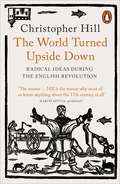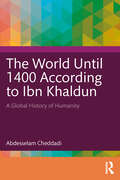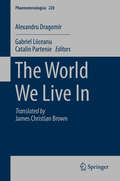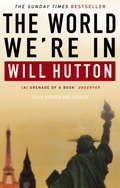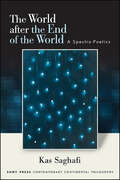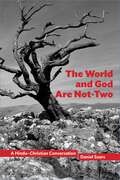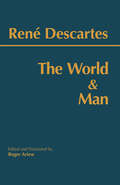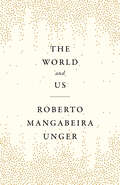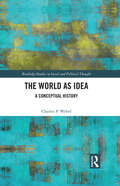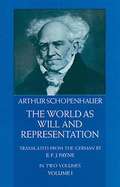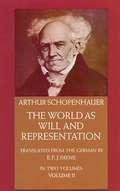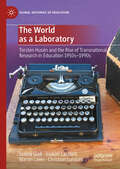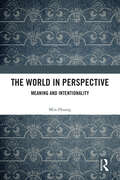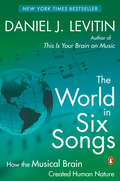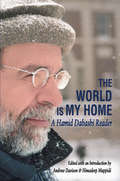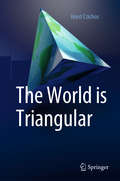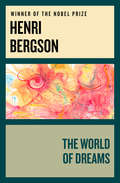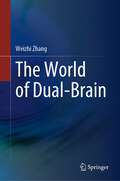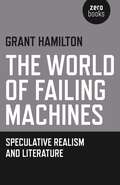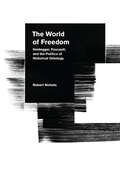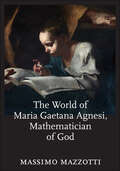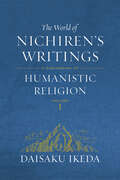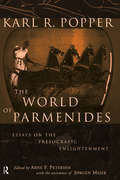- Table View
- List View
The World Turned Upside Down: Radical Ideas During the English Revolution
by Christopher Hill'His finest work and one that was both symptom and engine of the concept of "history from below" ... Here Levellers, Diggers, Ranters, Muggletonians, the early Quakers and others taking advantage of the collapse of censorship to bid for new kinds of freedom were given centre stage ... Hill lives on' Times Higher EducationIn 'The World Turned Upside Down' Christopher Hill studies the beliefs of such radical groups as the Diggers, the Ranters, the Levellers and others, and the social and emotional impulses that gave rise to them. The relations between rich and poor classes, the part played by wandering 'masterless' men, the outbursts of sexual freedom, the great imaginative creations of Milton and Bunyan - these and many other elements build up into a marvellously detailed and coherent portrait of this strange, sudden effusion of revolutionary beliefs.'Established the concept of an "English Revolution" every bit as significant and potentially as radical as its French and Russian equivalents' Daily Telegraph'Brilliant ... marvellous erudition and sympathy' David Caute, New Statesman'This book will outlive our time and will stand as a notable monument to the man, the committed radical scholar, and one of the finest historians of the age' The Times Literary Supplement'The dean and paragon of English historians' E.P. Thompson
The World Until 1400 According to Ibn Khaldun: A Global History of Humanity
by Abdesselam CheddadiThis book explores the significance of Ibn Khaldun’s magnum opus, the Book of Examples, to our understanding of human history and the disciplines of anthropology, history, and sociology.Operating outside of the confines of the Western intellectual tradition, Ibn Khaldun’s the Book of Examples is perhaps the first attempt to propose a global history of humanity. In doing so, Ibn Khaldun pioneered approaches from what we today term sociology, anthropology, ecology, economics, geography, and urban studies. Drawing upon the Muqaddima and the other volumes of the Kitab al-Ibar, Cheddadi proposes novel ways of viewing human history and classifying societies. While Ibn Khaldun’s attempts to develop a true global history were ultimately flawed, Cheddadi argues that they nevertheless offer pertinent lessons for our attempts to write a global history and to understand the world today.This stimulating and original work on a seminal figure in Islamic sociology and historiography will be of interest to students and researchers across the humanities and social sciences.
The World We Live In
by Alexandru Dragomirgabriel Liiceanu Catalin PartenieThis book contains twelve engaging philosophical lectures, most of them given during Romania's Communist regime. They were written by Alexandru Dragomir, a former student of Heidegger who never published anything in his lifetime. The lectures deal with a diverse range of topics, such as the function of the question, self-deception in the past, the present, and the future, and banalities with a metaphysical dimension. The book includes a phenomenological discussion of the topic of nation and examines what happens when the human race loses its sense of measure. It also addresses the true role of the intellect in contrast with the dominance of scientific abstraction in today's technical world. Among the thinkers discussed are Anaxagoras, Socrates, Plato, Aristotle, Descartes, and Nietzsche. Alexandru Dragomir was born in 1916 in Romania. After studying law and philosophy at the University of Bucharest (1933-1939), he left Romania to study for a doctorate in philosophy in Freiburg, Germany, under Martin Heidegger. He stayed in Freiburg for two years (1941-1943), but before defending his dissertation he was called back to Romania for military service and sent to the front. After 1948, historical circumstances forced him to become a clandestine philosopher: he was known only within a very limited circle, and even his friends did not know whether or not he was giving concrete expression to his philosophical preoccupations in a written work. He died in 2002 without ever publishing anything. It was only after his death that the "Dragomir notebooks" came to light.
The World We're In
by Will HuttonTHE STATE WE'RE IN, Will Hutton's explosive analysis of British society, was the biggest selling politico-economic work since the Second World War. Now, as the world realigns itself in the wake of September 11, Hutton turns his attention to the global picture, and the ways in which the new world should be ordered.To understand the global economy, Hutton argues, one must first understand the United States where, over the past 30 years, the forces of conservatism have achieved such supremacy as to reduce liberalism to a term of abuse. The results have been dire: America is a weaker, fragmented society, and its economic strenths are oversold and misunderstood.But Britain and Europe are different: our attitudes towards property, equality, social solidarity and the public realm are strikingly distinct from Amerrica's current conservative leanings. Europe should not be afraid to stand up against the American version of globalisation, and champion the cause of a reinvigorated international society - taking over the mantle now abandoned by the US.
The World We're In
by Will HuttonA wake-up call to Britain, and the global economyTHE STATE WE'RE IN, Will Hutton's explosive analysis of British society, was the biggest selling politico-economic work since the Second World War. Now, as the world realigns itself in the wake of September 11, Hutton turns his attention to the global picture, and the ways in which the new world should be ordered.To understand the global economy, Hutton argues, one must first understand the United States where, over the past 30 years, the forces of conservatism have achieved such supremacy as to reduce liberalism to a term of abuse. The results have been dire: America is a weaker, fragmented society, and its economic strenths are oversold and misunderstood.But Britain and Europe are different: our attitudes towards property, equality, social solidarity and the public realm are strikingly distinct from Amerrica's current conservative leanings. Europe should not be afraid to stand up against the American version of globalisation, and champion the cause of a reinvigorated international society - taking over the mantle now abandoned by the US.
The World after the End of the World: A Spectro-Poetics (SUNY series in Contemporary Continental Philosophy)
by Kas SaghafiIn this book, Kas Saghafi argues that the notion of "the end the world" in Derrida's late work is not a theological or cosmological matter, but a meditation on mourning and the death of the other. He examines this and several other tightly knit motifs in Derrida's work: mourning, survival, the phantasm, the event, and most significantly, the term salut, which in French means at once greeting and salvation. An underlying concern of The World after the End of the World is whether a discourse on salut (saving, being saved, and salvation) can be dissociated from discourse on religion. Saghafi compares Derrida's thought along these lines with similar concerns of Jean-Luc Nancy's. Combining analysis of these themes with reflections on personal loss, this book maintains that, for Derrida, salutation, greeting, and welcoming is resistant to the economy of salvation. This resistance calls for what Derrida refers to as a "spectro-poetics" devoted to and assigned to the other's singularity.
The World and God Are Not-Two: A Hindu–Christian Conversation (Comparative Theology: Thinking Across Traditions #10)
by Daniel SoarsThe World and God Are Not-Two is a book about how the God in whom Christians believe ought to be understood. The key conceptual argument that runs throughout is that the distinctive relation between the world and God in Christian theology is best understood as a non-dualistic one. The “two”—“God” and “World” cannot be added up as separate, enumerable realities or contrasted with each other against some common background because God does not belong in any category and creatures are ontologically constituted by their relation to the Creator.In exploring the unique character of this distinctive relation, Soars turns to Sara Grant’s work on the Hindu tradition of Advaita Vedānta and the metaphysics of creation found in Thomas Aquinas. He develops Grant’s work and that of the earlier Calcutta School by drawing explicit attention to the Neoplatonic themes in Aquinas that provide some of the most fruitful areas for comparative engagement with Vedānta. To the Christian, the fact that the world exists only as dependent on God means that “world” and “God” must be ontologically distinct because God’s existence does not depend on the world. To the Advaitin, this simultaneously means that “World” and “God” cannot be ontologically separate either. The language of non-duality allows us to see that both positions can be held coherently together without entailing any contradiction or disagreement at the level of fundamental ontology. What it means to be “world” does not and cannot exclude what it means to be “God.”
The World and Man (Hackett Classics)
by René DescartesIn late 1633, as Descartes was preparing The World and Man for publication, he learned that Galileo had been condemned by the Catholic Church for defending the motion of the earth. His reaction to the news was swift and powerful: as his own treatises also espoused the proposition deemed heretical, he canceled their publication. More than thirty years after Descartes had begun his project, these works were finally published, posthumously, both to acclaim and to controversy. Together, they profoundly influenced the course of modern philosophy. This volume presents Roger Ariew&’s clear and engaging translations of Descartes&’s treatises, along with a general Introduction, describing the long road to publication, the reception of the works, and their significance. Appendices provide selections from Descartes&’s correspondence on Galileo, Part V of the Discourse on Method, and a summary of Descartes&’s Description of the Human Body.
The World and Us
by Roberto Mangabeira Unger"A restless visionary striving to realize the highest aspirations of modernity itself."–New York TimesA radical re-envisioning of the human condition by the acclaimed Brazilian philosopherIn The World and Us, Roberto Mangabeira Unger sets out to reinvent philosophy. His central theme is our transcendence, everything in our existence points beyond itself, and its relation to our finitude: everything that surrounds us, and we ourselves, are flawed and ephemeral.He asks how we can live so that we die only once, instead of dying many small deaths; how we can breathe new life and new meaning into the revolutionary movement that has aroused humanity for the last three centuries, but that is now weakened and disoriented; and how we can make sense of ourselves without claiming for human beings a miraculous exception to the general regime of nature. For Unger, philosophy must be the mind on fire, insisting on our prerogative to speak to what matters most.From this perspective, he redefines each of the traditional parts of philosophy, from ontology and epistemology to ethics and politics. He turns moral philosophy into an exploration of the contest between the two most powerful contemporary moral visions: an ethic of self-fashioning and non-conformity, and an ethic of human connection and responsibility.And he turns political philosophy into a program of deep freedom, showing how to democratize the market economy, energize democratic politics, and give the individual worker and citizen the means to flourish amid permanent innovation.
The World as Idea: A Conceptual History (Routledge Studies in Social and Political Thought)
by Charles P. WebelIn The World as Idea Charles P. Webel presents an intellectual history of one of the most influential concepts known to humanity—that of "the world." Webel traces the development of "the world" through the past, depicting the history of the world as an intellectual construct from its roots in ancient creation myths of the cosmos, to contemporary speculations about multiverses. He simultaneously offers probing analyses and critiques of "the world as idea" from thinkers ranging from Plato, Aristotle, and St. Augustine in the Greco-Roman period to Kant, Schopenhauer, Nietzsche, Wittgenstein, Merleau-Ponty, and Derrida in modern times. While Webel mainly focuses on Occidental philosophical, theological, and cosmological notions of worldhood and worldliness, he also highlights important non-Western equivalents prominent in Islamic and Asian spiritual traditions. This ensures the book is a unique overview of what we all take for granted in our daily existence, but seldom if ever contemplate—the world as the uniquely meaningful environment for our lives in particular and for life on Earth in general. The World as Idea will be of great interest to those interested in the "world as idea," scholars in fields ranging from philosophy and intellectual history to political and social theory, and students studying philosophy, the history of ideas, and humanities courses, both general and specialized.
The World as Will and Representation, Vol. 1: The World As Will And Representation (The\cambridge Edition Of The Works Of Schopenhauer Ser.)
by Arthur SchopenhauerArthur Schopenhauer's Die Welt als Wille und Vorstellung is one of the most important philosophical works of the nineteenth century, the basic statement of one important stream of post-Kantian thought. It is without question Schopenhauer's greatest work. Conceived and published before the philosopher was 30 and expanded 25 years later, it is the summation of a lifetime of thought.For 70 years, the only unabridged English translation of this work was the Haldane-Kemp collaboration. In 1958, a new translation by E. F. J. Payne appeared that decisively supplanted the older one. Payne's translation is superior because it corrects nearly 1,000 errors and omissions in the Haldane-Kemp translation, and it is based on the definitive 1937 German edition of Schopenhauer's work prepared by Dr. Arthur Hübscher. Payne's edition is the first to translate into English the text's many quotations in half a dozen languages. It is thus the most useful edition for the student or teacher.
The World as Will and Representation, Vol. 2
by Arthur SchopenhauerVolume 2 of the definitive English translation of one of the most important philosophical works of the 19th century, the basic statement in one important stream of post-Kantian thought. Corrects nearly 1,000 errors and omissions in the older Haldane-Kemp translation. For the first time, this edition translates and locates all quotes and provides full index.
The World as a Laboratory: Torsten Husén and the Rise of Transnational Research in Education 1950s–1990s (Global Histories of Education)
by Martin Lawn Sotiria Grek Joakim Landahl Christian LundahlThis book covers the construction of international education research community in the 1950s-1990s, and the growth of its ‘disembedded’ laboratory i.e. networks, spaces, materiality, travelling, translations. The book follows a sociology of science theoretical framework in order to examine the research-archive of the Swedish internationally renowned educational scholar Torsten Husén (1916-2009). The archive reveals the shifting and heterogenous transnational networks that contribute to the development of social science research beyond fixed time and space dimensions, and that extends social science beyond individual ideas, researchers, environments, institutions and universities. These are practices that create, mobilise, sustain and challenge relations between actors in innovations, knowledge creation and various social activities. In other words, the archive represents the socio-material manifestation not only of the intellectual trajectory of a key education actor but the growing organisation of a whole scientific field at the time.
The World in Perspective: Meaning and Intentionality
by Min HuangThis book aims to reclaim the significance of meaning within the philosophical thinking that has evolved from Descartes and Locke through Kant, Husserl, and Frege, focusing on intentionality—the mind's directedness toward the reality.The author opens with an epistemological account of analyticity and illustrates the central role of intentionality within it. A transcendentalist view on intentionality is then adopted, in contrast with the prevalent naturalist stance. Addressing key themes in the philosophy of language—truth, representation, propositions, predication, reference, and sense— the book presents a framework for a meaning–intentionality theory, which integrates key insights from Frege, Husserl, Wittgenstein, Dummett, and Davidson.The book will appeal to scholars and graduate students of epistemology, philosophy of language, philosophy of mind, theory of meaning, and theory of intentionality.
The World in Six Songs
by Daniel J. LevitinThe author of the New York Times bestseller This Is Your Brain on Music reveals music's role in the evolution of human culture-and "will leave you awestruck" (The New York Times) Daniel J. Levitin's astounding debut bestseller, This Is Your Brain on Music, enthralled and delighted readers as it transformed our understanding of how music gets in our heads and stays there. Now in his second New York Times bestseller, his genius for combining science and art reveals how music shaped humanity across cultures and throughout history. Dr. Levitin identifies six fundamental song functions or types-friendship, joy, comfort, religion, knowledge, and love-then shows how each in its own way has enabled the social bonding necessary for human culture and society to evolve. He shows, in effect, how these "six songs" work in our brains to preserve the emotional history of our lives and species. Dr. Levitin combines cutting-edge scientific research from his music cognition lab at McGill University and work in an array of related fields; his own sometimes hilarious experiences in the music business; and illuminating interviews with musicians such as Sting and David Byrne, as well as conductors, anthropologists, and evolutionary biologists. The World in Six Songs is, ultimately, a revolution in our understanding of how human nature evolved-right up to the iPod. Read Daniel Levitin's posts on the Penguin Blog.
The World is My Home: A Hamid Dabashi Reader
by Andrew Davison & Himadeep MuppidiAs recent events indicate, Iranian, Middle Eastern, and Islamic politics more broadly have been deeply influential in world affairs. Hamid Dabashi has been a highly visible and prominent commentator on these affairs, explaining, interpreting, and providing a critical perspective. This volume gathers together his most influential and insightful writings. As one of the foremost contemporary public intellectuals and scholars of our time, Dabashi's interests and writings span subjects ranging from Islamic philosophy and political ideology to Iranian art and Persian literature, from Sufism and Orientalism to Iranian and world cinema and contemporary Arab and Muslim visual arts; and from postcolonial theory and globalization to imperialism and public affairs. There is a direct connection between his theoretical innovations and the angle of his public interventions on the urgent global issues of the day. This book brings together some of his most important writings, especially those that offer new ways of understanding Islam, Iran, Islamist ideology, global art, and the condition of global modernity. The book shows the underlying conceptual themes that unify Dabashi's wide-ranging and brilliantly insightful corpus. Dabashi combines deep knowledge of the subject matter about which he writes, and highly refined sociological, hermeneutical, and cultural interpretive skills, moving far beyond the limiting, distorted, and intellectually stifling character of reigning absolutist conventions. He places existing authoritative frameworks under close scrutiny in order to produce novel and penetrating insights. These essays reflect historical and geographical worlds that are best viewed when Hamid Dabashi's work is read as a whole, which this one- volume work makes possible for the first time.
The World is Triangular
by Horst CzichosThis book gives a short presentation of the triad philosophy–physics–technology against the background of the common origin in ancient times. The emergence of the book has been described in the foreword of the first edition. The present second edition of the book is updated and extended, whereby new physical research results and technological innovations were included: - The physics of space and time after the experimental detection of gravitational waves (Nobel Prize for Physics 2017). - The New International System of Units (SI) for Physics and Technology which is completely based on natural constants and entered into force on World Metrology Day, 20 May 2019. - Actual overview of basic technologies: Material, Energy, Information. - Technologies for the “Digital World” of information and communication. - Mechatronic and Cyber-physical systems for Industry 4.0. The significance of technology for the world in the 21st century is discussed in the final section of the book.
The World of Dreams
by Henri BergsonBergson incorporated the best of contemporary thinking in all his works. These thinkers included A. Krauss, Delage, Freud, and W. Robert. Bergson talks about how our sensory organs (eyes) are involved in dreams so that we think we perceive something but when we open our eyes it vanishes. This book is not a dictionary of dreams but a stunning example of how dreams work and function. Henri-Louis Bergson was a major French philosopher, influential in the first half of the 20th century. One of Bergson&’s main problems is to think of novelty as pure creation, instead of as the unraveling of a predetermined program. His is a philosophy of pure mobility, unforeseeable novelty, creativity and freedom, which can thus be characterized as a process philosophy. It touches upon such topics as time and identity, free will, perception, change, memory, consciousness, language, the foundation of mathematics and the limits of reason.
The World of Dreams
by Henri BergsonBergson incorporated the best of contemporary thinking in all his works. These thinkers included A. Krauss, Delage, Freud, and W. Robert. Bergson talks about how our sensory organs (eyes) are involved in dreams so that we think we perceive something but when we open our eyes it vanishes. This book is not a dictionary of dreams but a stunning example of how dreams work and function. Henri-Louis Bergson was a major French philosopher, influential in the first half of the 20th century. One of Bergson&’s main problems is to think of novelty as pure creation, instead of as the unraveling of a predetermined program. His is a philosophy of pure mobility, unforeseeable novelty, creativity and freedom, which can thus be characterized as a process philosophy. It touches upon such topics as time and identity, free will, perception, change, memory, consciousness, language, the foundation of mathematics and the limits of reason.
The World of Dual-Brain
by Weizhi ZhangThis book leaves the template of the inertia of natural human society and traditional ideological thinking, to illustrate the mechanism of the generation of the Sociality Brain and to explore the construction path of the human-computer symbiosis order. At the same time, this book proposes concepts including ‘wisdom sharing system’, ‘the Sociality Brain’, ‘dual-brain world’, ‘off-site economic civilization’, ‘basic contradictions in the intelligent world’, and ‘class analysis and division of the dual-brain world’, etc. This is a philosophical thinking about the intelligent world beyond the categories of natural human society and biological brain.
The World of Failing Machines: Speculative Realism and Literature
by Grant HamiltonThe World of Failing Machines offers the first full-length discussion of the relationship between speculative realism and literary criticism. In identifying some of the most significant coordinates of speculative-realist thought, this book asks what the implications might be for the study of literature. It is argued that the first casualty might well be the form of the traditional essay.
The World of Freedom: Heidegger, Foucault, and the Politics of Historical Ontology
by Robert NicholsMartin Heidegger and Michel Foucault are two of the most important and influential thinkers of the twentieth century. Each has spawned volumes of secondary literature and sparked fierce, polarizing debates, particularly about the relationship between philosophy and politics. And yet, to date there exists almost no work that presents a systematic and comprehensive engagement of the two in relation to one another. "The World of Freedom" addresses this lacuna. Neither apology nor polemic, the book demonstrates that it is not merely interesting but necessary to read Heidegger and Foucault alongside one another if we are to properly understand the shape of twentieth-century Continental thought. Through close, scholarly engagement with primary texts, Robert Nichols develops original and demanding insights into the relationship between fundamental and historical ontology, modes of objectification and subjectification, and an ethopoetic conception of freedom. In the process, his book also reveals the role that Heidegger's reception in France played in Foucault's intellectual development--the first major work to do so while taking full advantage of the recent publication of Foucault's last College de France lectures of the 1980s, which mark a return to classical Greek and Roman philosophy, and thus to familiar Heideggerian loci of concern.
The World of Maria Gaetana Agnesi, Mathematician of God (Johns Hopkins Studies in the History of Mathematics #2)
by Massimo MazzottiThe fascinating true story of mathematician Maria Agnesi.She is best known for her curve, the witch of Agnesi, which appears in almost all high school and undergraduate math books. She was a child prodigy who frequented the salon circuit, discussing mathematics, philosophy, history, and music in multiple languages. She wrote one of the first vernacular textbooks on calculus and was appointed chair of mathematics at the university in Bologna. In later years, however, she became a prominent figure within the Catholic Enlightenment, gave up academics, and devoted herself to the poor, the sick, the hungry, and the homeless. Indeed, the life of Maria Agnesi reveals a complex and enigmatic figure—one of the most fascinating characters in the history of mathematics. Using newly discovered archival documents, Massimo Mazzotti reconstructs the wide spectrum of Agnesi's social experience and examines her relationships to various traditions—religious, political, social, and mathematical. This meticulous study shows how she and her fellow Enlightenment Catholics modified tradition in an effort to reconcile aspects of modern philosophy and science with traditional morality and theology.Mazzotti's original and provocative investigation is also the first targeted study of the Catholic Enlightenment and its influence on modern science. He argues that Agnesi's life is the perfect lens through which we can gain a greater understanding of mid-eighteenth-century cultural trends in continental Europe.
The World of Nichiren's Writings, vol. 1: A Discussion of Humanism Religion
by Daisaku IkedaIn these insightful discussions, Daisaku Ikeda explores from a variety of angles the life, times, and teachings of Nichiren Daishonin as described in his writings. We learn how Nichiren' s actions— from his vows at an early age to bring happiness to the people through his fearlessness in face of life-threatening persecutions— can become a model for us today. And the humanistic interpretations of key Buddhist concepts bring new clarity to ideas such as “ attaining Buddhahood in this lifetime” and “ establishing the correct teaching for the peace of the land.” More than just history and theory, the inspiration offered here aims to provide a deeper understanding of how to put into daily practice Nichiren's philosophy of hope and victory.
The World of Parmenides: Essays on the Presocratic Enlightenment (Routledge Classics Ser.)
by Karl PopperThis unique collection of essays, published together for the first time, not only elucidates the complexity of ancient Greek thought, but also reveals Karl Popper's engagement with Presocratic philosophy and the enlightenment he experienced in his reading of Parmenides. As Karl Popper himself states himself in his introduction, he was inspired to write about Presocratic philosophy for two reasons - firstly to illustrate the thesis that all history is the history of problem situations and secondly, to show the greatness of the early Greek philosophers, who gave Europe its philosophy, its science and its humanism.
